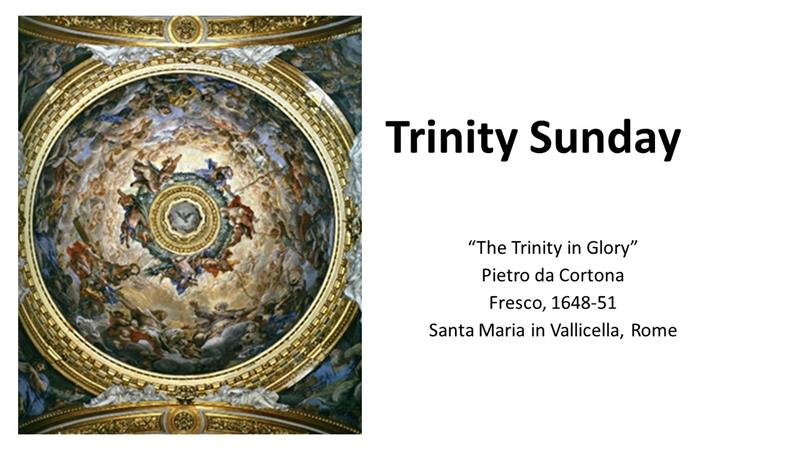
Jeff Garrison
Skidaway Island Presbyterian Church
Matthew 28:16-20
Trinity Sunday
June 7, 2020
To watch to this service, click here.
Disclaimer: Just because I use wheat bread and don’t use Hellmann’s Mayonnaise on tomato sandwiches doesn’t mean I’m a heretic, despite what members of my Bible Study think.
Introduction Before Worship:
Last Sunday was Pentecost. Today is Trinity Sunday. If you go by the liturgical calendar, this is the last “big” Sunday until we come to the end of the Pentecost season, when we are back at Advent. The Pentecost season, also called “ordinary time,” takes up the largest chunk of the church year. We’re reminded that our lives are mostly lived outside of feasts and holidays. Yes, there are times for big celebrations, but there are also normal times in which we live out our faith while doing the laundry, fixing dinner, paying the bills, or mowing the grass. But God is God of all. It’s all sacred, even the ordinary periods of life.
We enter this season on Trinity Sunday. The Trinity, this great mystery, reminds us that God is relational. The ceiling painting we’re using as our artwork today illustrates this. God relates, not just within the three persons of the Godhead. You can see the Trinity represented as the Father and the Son in the bottom along with the dove in the center. But these persons are surrounded by all kinds of heavenly and earthly beings. The Trinity also reminds us of God’s desire to bring more into this life—heavenly beings as well as human beings. The Trinity is about love—the love of the three persons within the Trinity as well as their love for all creation, as we’re embraced within the family. We live in a world of sin and only in God can there be true love so we need to accept the invite to come in close. As a Russian Orthodox meditation on the Trinity proposes, “outside the Trinity is hell.”[1]
The Trinity isn’t a philosophical or theological concept for us to master. We can’t fully comprehend such a mystery. Instead, we accept it along with the love God shows us. Today’s passage is the only place where Jesus uses the trinitarian formula, “Father, Son and Holy Spirit, which is from the end of Matthew’s gospel, chapter 28, verses 16-20.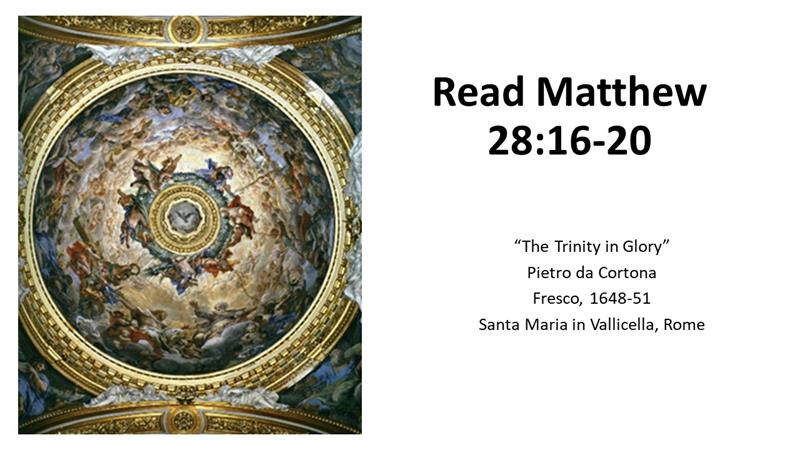
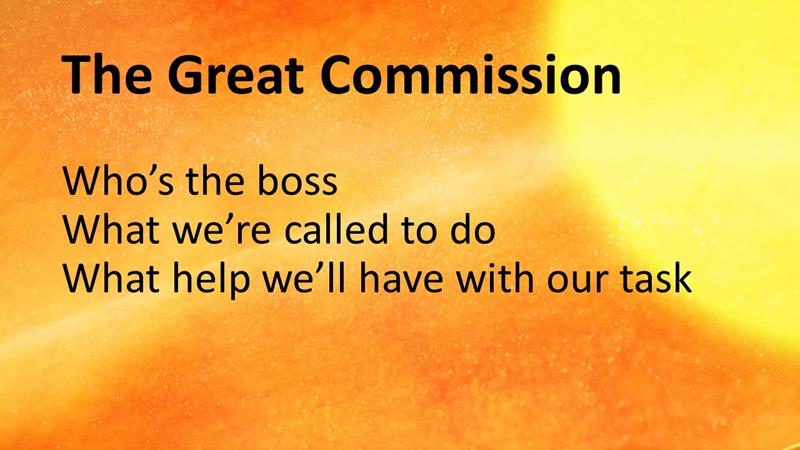
This passage is known as “The Great Commission.” At the end of Matthew’s gospel, Jesus commissions his disciples to take over. We learn three important things here: Who’s the boss. What we’re called to do. What help we’ll have with our task at hand. We don’t learn much about the Trinity. But our faith is to be active. It’s more about doing than knowledge, and this passage is a call to action.
Many of the highlights of Matthew’s gospel occur on high places: mountains or hills. We have Jesus’ temptation, the Sermon on the Mount, the transfiguration, and even the crucifixion. Now, once more, Jesus calls the eleven remaining disciples up on a mountain in Galilee. They’re back in their old haunts, where their ministry had been focused, but up high, they are away from the crowds.
Interestingly, we’re told that the disciples worshipped Jesus even though some doubted. This is an important insight for those of us with doubts. Even some of the disciples doubted, but they listened and obeyed and followed Jesus. Accepting everything perfectly is not as important as doing the work for which we’re called.
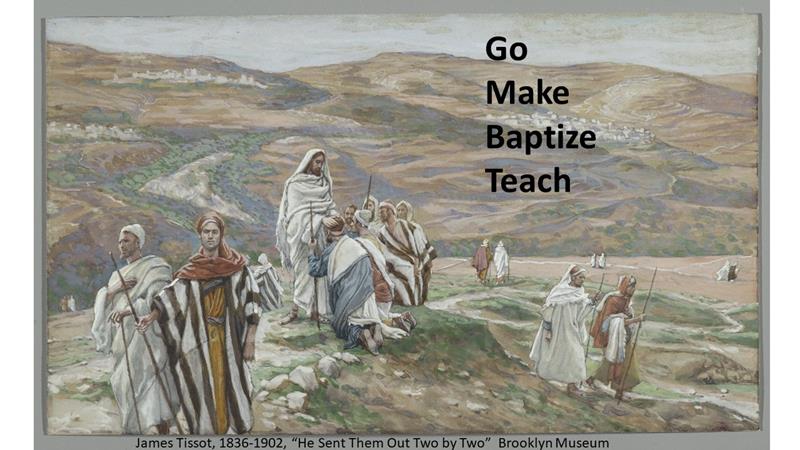
With the remaining disciples gathered, Jesus tells them who’s boss. “All authority in heaven and earth have been given to me.” At the beginning of his ministry, the devil tempted Jesus on another mountain with authority over the earth, but now we learn that for the resurrected Christ, authority will extend far beyond that.[2] As the one in charge, Jesus is the one who can commission the disciples for the work at hand. And Jesus wastes no time issuing his orders. With four verbs—go, make, baptize, and teach— he sends them out to all nations.

Let’s unpack this a bit, first by looking at the destination, “all nations.” The promise to Abraham was for land and descendants, but Jesus owns all the world, so now the call is for all people, not just for a particular family. Jesus’ new family, the church, extends beyond national boundaries. While they may be national churches, there is no such place for an only American Christian, or a British Christian, or a Ugandan Christian. We are Christians, first and foremost. This idea of all nations means that our work isn’t limited to just people like us.[3] The gospel needs to be heard by everyone. Paul later captured this vision when he wrote, “there is no longer Greek or Jew, for we are all one in Jesus Christ.[4]
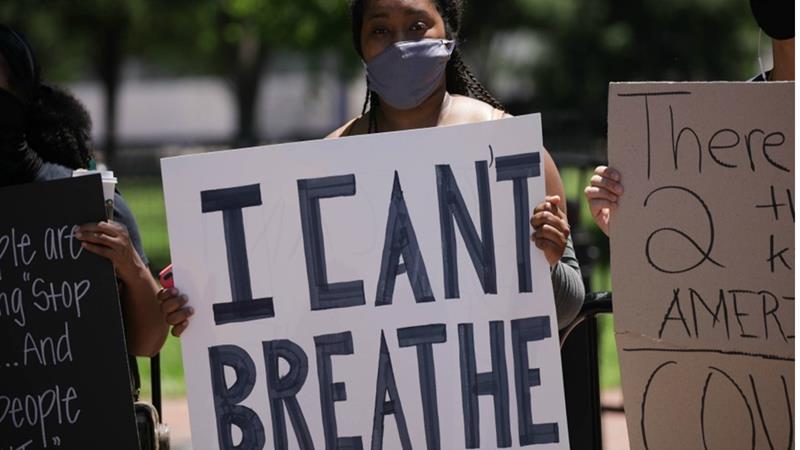
Yet, we’re still living in a divided world and, as from what we’ve seen over the past few weeks, there is much work to be done to overcome this. As believers in Jesus, we can’t condone the actions of a few men in Brunswick or a police officer in Minneapolis, each case leading to an unnecessary death.[5] As a people, we must cry out for justice. Our present world, in which the color of one’s skin means you’re treated differently, does not represent the image of what Christ envisions in Scripture.
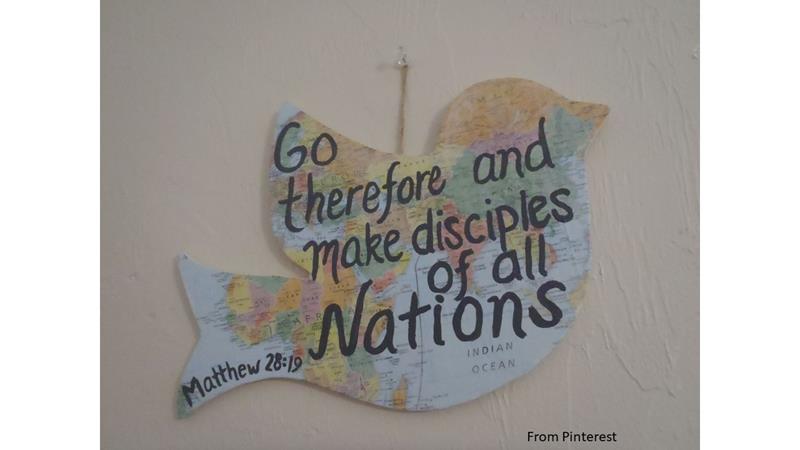
Jesus calls us to make disciples. Interestingly, Jesus doesn’t say to go out and make Christians. Instead, we’re to make disciples, or students of Jesus Christ. Making disciples isn’t an instant conversion. It requires time.[6] Such folks may even have questions and doubts, as we see with the original disciples, but at the very least they are open to learning from the Master. As we make disciples, we baptize them in God’s three-fold name: Father, Son, and Holy Spirit. In other words, those who sign up to learn from Jesus are connected to the Triune God. We’re part of that holy fellowship in which all followers are invited to join. And we’re to teach these people what Jesus commands. Being a follower of Christ means we strive to keep Jesus’ teachings. God gives us commandments as a way to help us live in a way that will be affirming of God and of our brothers and sisters. But people won’t know what those commandments are unless they are taught.

That’s right. People need to be taught. And judging a lot of what happening, it appears that before we go out into the world to teach, we need a refresher course in this country. We need to be taught that just because someone makes us uncomfortable because of the color of his skin, we can’t take the law in our own hands and attempt a “citizen arrest,” as a few men supposedly tried to do down in Brunswick back in February.
More recently, in Minnesota, we had a police officer attempting to arrest someone who may have passed a twenty dollar counterfeit bill (which he may or may not have known was counterfeit). Is a life only worth 20 bucks? George Floyd was already cuffed and subdued. He wasn’t a threat. Yet the officer kept his knee on his neck three minutes after he became unresponsive. Of course, looting and burning is not acceptable either, but where did this problem begin? It didn’t begin with protests, but with an officer doing an unthinkable act. Officers are supposed to protect and serve, but for at least a part of our population this isn’t their experience.
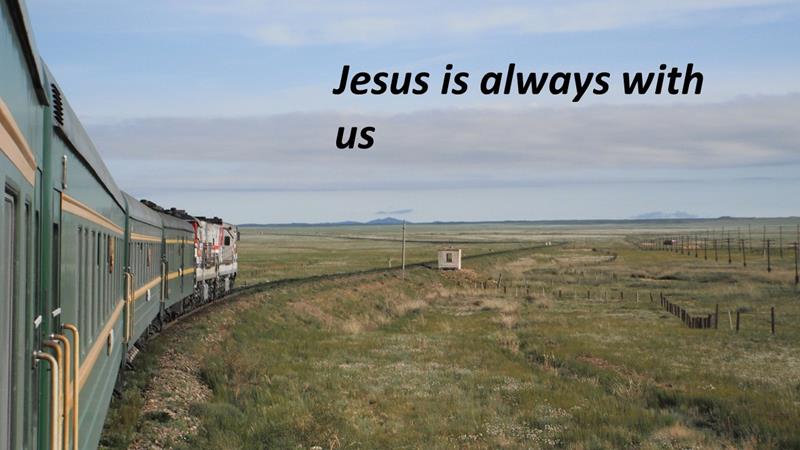 We’re living in trying times, but there is hope in this passage. In the last verse, after telling us that it’s our responsibility to make and baptize and teach disciples, Jesus reminds us that he will be with us till history comes to an end. Jesus is going to be with us wherever we go in this world to do the gospel’s work. That’s the hope we take with us as we challenge such injustice. We’re not alone. We’ll get through this trying time of pandemic and racial tensions if we can just remember the two essential things Jesus taught: Love God and love your neighbor.[7]
We’re living in trying times, but there is hope in this passage. In the last verse, after telling us that it’s our responsibility to make and baptize and teach disciples, Jesus reminds us that he will be with us till history comes to an end. Jesus is going to be with us wherever we go in this world to do the gospel’s work. That’s the hope we take with us as we challenge such injustice. We’re not alone. We’ll get through this trying time of pandemic and racial tensions if we can just remember the two essential things Jesus taught: Love God and love your neighbor.[7]
 You know, I love my neighbors, but I also love a good tomato sandwich. During this time of the year, when I have tomatoes on the vine, I eat a tomato sandwich every day. I peel the tomatoes and then slice ‘em thick. They are juicy and messy. I take two slices of wheat bread, cover a side of each with Miracle Whip, grind some pepper over it, then lay on the tomatoes and create a sandwich. If I want to be uptown, I might add a little celery seed or some provolone cheese. Its good eating and I tell you this because our passage can be envisioned as a sandwich.[8] Outside, the two pieces of bread, are about Jesus—one slice of bread being his authority and the other being his promise to be with us. Inside the sandwich, the thick tomato, is our marching orders. As followers of Jesus, it’s not about us. We’re not about glorifying ourselves. We’re here to do the work of the one whose authority extends over all heaven and earth, the one who also promises to be with us. Because of Christ’s power and presence, we can boldly take risks for the sake of the triune God, who calls us into a community in order to send us out to make disciples.
You know, I love my neighbors, but I also love a good tomato sandwich. During this time of the year, when I have tomatoes on the vine, I eat a tomato sandwich every day. I peel the tomatoes and then slice ‘em thick. They are juicy and messy. I take two slices of wheat bread, cover a side of each with Miracle Whip, grind some pepper over it, then lay on the tomatoes and create a sandwich. If I want to be uptown, I might add a little celery seed or some provolone cheese. Its good eating and I tell you this because our passage can be envisioned as a sandwich.[8] Outside, the two pieces of bread, are about Jesus—one slice of bread being his authority and the other being his promise to be with us. Inside the sandwich, the thick tomato, is our marching orders. As followers of Jesus, it’s not about us. We’re not about glorifying ourselves. We’re here to do the work of the one whose authority extends over all heaven and earth, the one who also promises to be with us. Because of Christ’s power and presence, we can boldly take risks for the sake of the triune God, who calls us into a community in order to send us out to make disciples.
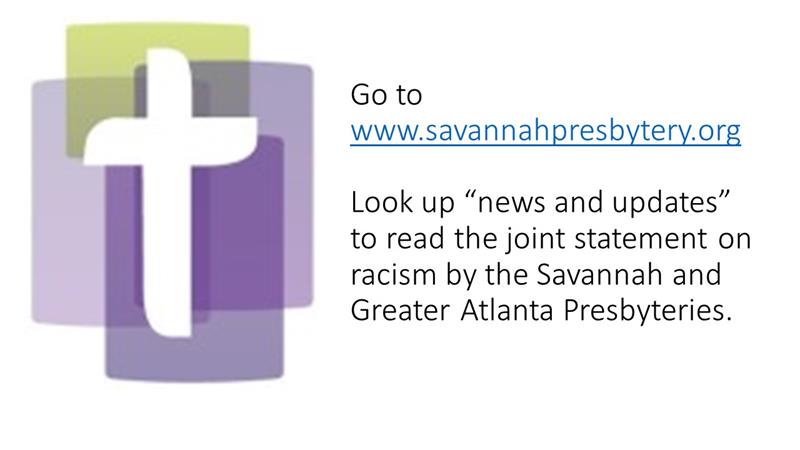 In closing, let me encourage you to do two things. First, go to the Savannah Presbytery website and read our recent statement on racism.[9] Second, ask yourself: “What can I do to help people become curious about Jesus so they might desire to become a disciple?” Amen.
In closing, let me encourage you to do two things. First, go to the Savannah Presbytery website and read our recent statement on racism.[9] Second, ask yourself: “What can I do to help people become curious about Jesus so they might desire to become a disciple?” Amen.
©2020
[1] Kathleen Norris, Amazing Grace: A Vocabulary of Faith (New York: Riverhead Books, 1998), 291.
[2] Matthew 4:8-10.
[3] See Frederick Dale Bruner, The Churchbook: Matthew 13-28 (Grand Rapids: Eerdmans, 2004), 816-820.
[4] Galatians 3:28 (edited to focus on nationality)
[5] On June 3, 2020, the Savannah Presbytery made a statement about the Brunswick case and referred to the Minneapolis situation. See http://www.savannahpresbytery.org/savannah-presbytery-news-and-update/
[6] Bruner, 815-816.
[7] Matthew 22:34-40.
[8] The idea of this passage being a “sandwich comes from Bruner, 804.
[9] Look for the post from June 3, 2020: http://www.savannahpresbytery.org/savannah-presbytery-news-and-update/

I love tomato sandwiches as well.
Yes, racism and police brutality are anti-Christian and anti-human.
I wish it only amounted to the actions of a few, but the greater police force stemmed from the KKK and racist ideology. (The first cops were slave catchers, from my understanding). The battle will be long and hard, but I’m glad you’re an ally.
Stay safe and well, Sage.
Thanks, Robyn. I hope you are staying well and safe during this troubling time.
Yes, nothing ordinary about this year. We really didn’t need the horrible racism problems along with everything else. But maybe we are gaining a better clarity of the problems that need to be fixed.
Your tomato sandwich looks good. Maybe I’ll make one of those tomorrow.
that’s actually not my sandwich–I should take my own photo but didn’t have the time… I hope you have some good homegrown tomatoes for your sandwich!
As we enter into this Ordinary Time, I hope we can listen and learn from the scriptures as they focus on Jesus and His life.
That sandwich looks tasty. Personally, I don’t do mayo or salad dressing. I’ll take mine with a little mustard (any kind will do) or sweet vidalia onion dressing.
I like spicy mustard but mostly on meat sandwiches. Never tried it on a tomato sandwich
Praying for racism to end! Beautiful post as always!
Amen to your prayer, Natalia
Christianity needs to always be about justice,
Police brutality is shocking, the amount of institutional racism in police forces is shocking. As the previous commentator says, police need to be better trained.
On a lighter note, I may have a tomato sandwich for lunch…..
I hope you have some juicy tomatoes! Here, store brought tomatoes just don’t cut it, you have to grow them yourself and let them vine ripen.
So much confusion to overcome, but I want to clarify something. The elected president of the Minneapolis Police Union, Lt. Bob Kroll, has been publicly promoting police violence since before he was elected, and created a culture of police violence including neck restraint. The single event that made headlines was not the first brutal act condoned by this person nor the attorneys that excused the acts before this one. We must understand that police are highly trained, and that bad training creates a bad culture. Firing cops doesn’t stop the violence, unless the cops fired are the ones encouraging violence from afar.
You’re right, Tom, bad training is a problem. We need to encourage more community policing where the police are seen as a part of the community, not something from beyond the community.
I like what you said about Jesus calling us to make disciples and not instant converts. I listened to a podcast recently that said that rabbis make a practice of turning away converts to Judaism three times before beginning any sort of teaching.
there is some wisdom in making sure someone is ready for such a commitment before continuing to invest in them. I will have to search for where that idea came from–it’s a good illustration
Racism is awful :/
I agree!
Hopefully, we as a country have reached a tipping point on police brutality. Personally, I’m done with the usual excuse about the job being tough and cops fearing for their lives.
I know being a cop is dangerous and that they are underpaid. Still doesn’t mean they should act like Nazi stormtroopers.
Hopefully such brutality will began to wane–SOON!